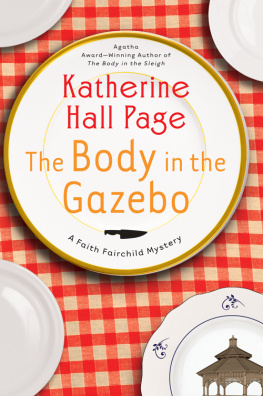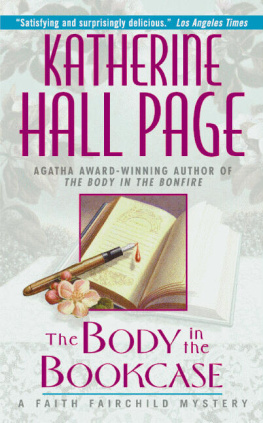THE BODY IN THE KELP
By
Katherine Hall Page
There is, one knows not what sweet mystery about this sea, whose gently awful stirrings seem to speak of some hidden soul beneath .. .
-HERMAN MELVILLE
1
Matilda Prescott was sitting up in bed piecing a quilt.
It was after midnight, but she wasn't sleepy. She never seemed to get really sleepy anymore and only tumbled in and out of fitful naps. Not what you'd call an honest-to-goodness night's sleep. Catnaps.
The cat, meanwhile, was snoring away at the foot of the pine four-poster that had been Matilda's grandmother's marriage bed. Matilda contemplated him with mingled affection and exasperation. Darn cat.
She put in the last stitches and cut the thread, then reached for a pencil from the nightstand. At the edge of the quilt top she lightly printed: "M. L. P. " Matilda Louise Prescott. She'd always liked the way her name sounded. Solid. Then she added a few words. Shed embroider it in the morning.
The bedroom door opened a crack. Matilda glanced up brightly without surprise.
Now what are you doing here at this hour? Oh, I know you're up and around. Don't think I don't know what 's going on, but what do you have to come bothering me for? Just get out and leave me be. I'm sick to death of you. Sick to death of all of you.
The door closed. An hour later it noiselessly opened again. Matilda didn't look up. She thought she must be falling asleep, but this wasn't sleep. She needed some air. She gasped for breath. Too many covers. She seemed to be tangled up in the quilt, but when she tried to pull it off, it wouldn't budge.
Sick to death.
Faith Fairchild and her husband, Tom, were sitting on the porch of the small Maine coastal farmhouse they had rented on Sanpere Island for the month of August. Tom was reading and Faith was doing nothing. The house was set high upon a granite ridge, and a broad meadow swept down to a cove. Across the water was a lobster pound, and Faith had grown accustomed to the putt-putt-putt of the lobster boats delivering their catch. When the wind was right, or wrong, they could smell the bait and fuel for the boats, a powerful combination; but somehow it seemed to go with the territory.
The farmhouse had long since been converted to summer occupancy and was filled with all the appropriate paraphernalia a rusticator might need: croquet and badminton sets, picnic gear, rain hats, sun hats, star charts, jigsaw puzzles, fishing poles, butterfly nets, board games, and bookcases crammed with slightly musty copies of Wodehouse, Jack London, Mary Roberts Rinehart, E. Phillips Oppenheim, plus all the paperbacks the family had ever acquired as well as those left behind by tenants and guests, everything from Jackie Collins to May Sarton. The adjacent barn hadn't seen a cow in more than fifty years, and it too was filled to the rafters with equipment for leisure-time activities: bikes, a Ping-Pong table, canoes, a kayak, gardening tools. Faith found it daunting even to look in there and unconsciously stood a little straighter whenever she entered the door. All this clean livingplunges into the arctic water at dawn followed by cold showers, no doubtleft her feeling vaguely uneasy. As if Teddy Roosevelt's ruddy, hearty ghost was spying on her from behind one of the archery targets. Her plan for August had been something less strenuous in the Hamptons.
Tom, however, was delighted. This was exactly the way he and his family had spent their summers, and the rest of the year, on Massachusetts's South Shore. When the weather had been too bad for messing about with boats, rafts, or anything else that would floatand it had to be gale-force winds to discourage the little Fairchildsthey had holed up inside the house to play Monopoly for hours. Faith's idea of a good time as a child had been to stroll over to the Metropolitan Museum of Art and play hide-and-seek in the Egyptian wing, followed by hot chocolate at Rumpelmayer's. She loathed all board games, and the only card games she knew how to play were go fish and poker.
Still, she liked the farmhouse and her native curiosity"dangerous curiosity" according to Tomhad prompted her to snoop around trying to piece together a picture of the Thorpe family who owned it but no longer used it.
There was a photograph album in the attic that affirmed her conviction that their shoulders were broad, calves sturdy, and haircuts terrible. They also seemed to have a penchant for wearing each other's clothes, or maybe they just bought them in lots. In any case, most of the garments were tan, and to say that L.L. Bean would have been haute couture describes them sufficiently. Nevertheless Faith had grown fond of the family and given them names she thought they would likegood Yankee names like Elizabeth, John, and Marian.
That Faith was here, five hours north of Boston, not two hours east of Manhattan, whiling away her time in this fashion, was due entirely to the blandishments of her neighbor and friend, Pix Miller, who had been coming to Sanpere since childhood. Pix painted such a vivid picture of deep-blue seas and murmuring pines that Faith agreed to try it. The fact that Pix also guaranteed a baby-sitter for two-year-old Benjamin Fairchild in the shape of her teenage daughter, Samantha, tipped the balance. At present Faith would have summered in Hoboken if someone had offered a baby-sitter along with it. They didn't call them "terrible twos" for nothing.
So, having made absolutely sure there was a bridge in good working order to the mainland, she packed her bug spray along with the Guerlain and prepared to "rough it." Pix was delighted. "You'll see. We'll have fun. There's always so much going on.
Staring at the absolutely calm water and flat horizon from the porch, Faith sincerely doubted that. Yet, although she wouldn't exactly say she was having fun, she was having something close to it. And Pix was right about one thing: Penobscot Bay was beautiful.
Plus there was the foodlobster, mussels, clams, fresh fish, and a small farmer's market on Saturdays with great vegetables and a goat cheese made by Mrs. Carlan that rivaled anything Zabar's stocked.
Faith's interest in food was personal and professional. She had risen to fame and fortune as the founder of a Manhattan catering firm, Have Faith, giving up the Big Apple for the bucolic orchards of New England when she fell head over heels in love with Tom Fairchild and married him soon afterward. Faith had a tendency to act precipitously. Tom, who was the village parson in Aleford, Massachusetts, did not. But this was a special case. A very special case.
Faith had managed to make life in the small town a bit more interesting by giving birth to Benjamin, finding a parishioner's corpse in Aleford's belfry, and getting locked in the killer's preserves cabinetpretty much in that order.
Lately, when she was not chasing after Benjamin, conscientiously trying to help him reach his third birthday intact, she had been expanding the Have Faith product linejams, jellies, chutneys, sauces. She was also thinking of starting up the catering business again in Boston, with the same name since Tom didn't seem to think it would rock the pews too much.
Faith was no stranger to the ministry. Her father and grandfather were both men of the cloth, and she had had an insider's view of parish life from childhood. The last thing she had ever thought she would do was stretch her sojourn inside the goldfish bowl into adulthood. But in some cases the heart knows no reason.
Tom was navely insistent that it was possible to have a private life in a small parish and urged Faith to feel free to go her own way and voice her opinions. Although when Faith's remark to someone in the Stop and Save that she thought skinny-dipping was more wholesome than ogling the centerfold in
Next page




